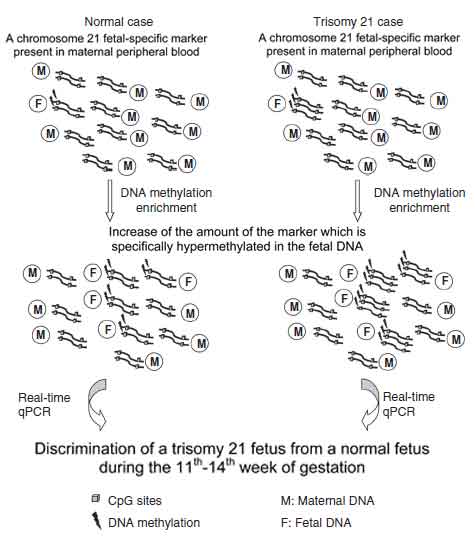Towards a novel non-invasive prenatal diagnostic test for Down syndrome

Researchers have described experiments proposing a new non-invasive prenatal diagnostic test for the presence of a third chromosome 21 that is characteristic of Down syndrome (also known as Down’s syndrome). Although the authors suggest a large-scale study is needed, the results, published this week in Nature Medicine, suggest the test is accurate and reliable.
Down syndrome is the most frequent underlying cause of learning disabilities, affecting around one in 700 births. A child with Down syndrome has three, rather than the normal two, copies of chromosome 21. Currently, Down syndrome is diagnosed by one or more of three invasive techniques that carry a risk to the fetus. The new work seeks to reduce this risk and to improve detection.
“There is a real need to improve prenatal diagnosis. We have used our understanding of biology to develop a blood test for the mother that reports chromosome number in the baby.
“Our results were really exciting: we correctly determined every Down syndrome and every unaffected baby in our test.”
Professor Philippos Patsalis Senior author and leader of the research from the Cyprus Institute of Neurology and Genetics
The new test requires only a sample of blood from the mother. In the mother’s blood circulation are free DNA molecules – and about 5 per cent of that free DNA is derived from fetal cells.
The new test can pick up fetal DNA signals – even though this is in the minority in the mother’s blood – because it detects changes called methylation that can occur more in fetal than in maternal DNA. The team targeted carefully chosen regions of chromosome 21. This allows them to measure how many copies of chromosome 21 are present.
“One key development was the ideal combination of regions that we defined. These provide the best combination of sensitivity and specificity.”
Professor Philippos Patsalis Cyprus Institute of Neurology and Genetics
The team looked at 80 samples of maternal blood; 34 were Down syndrome pregnancies and 46 were not. The test correctly identified all samples.
“This is one example of how modern genetic research can work to improve prenatal care. From the biological understanding of fetal and maternal genomes, we can work to develop more accurate, simpler, less invasive systems to give the best information to the mother.”
Dr Nigel Carter from the Wellcome Trust Sanger Institute an author on the paper
The method is simple, fast and easy to perform in every genetic diagnostic lab worldwide because it does not require expensive equipment, software or special infrastructure. It is also currently considerably cheaper than techniques such as DNA sequencing.
The team suggests that the technique might also be used for other chromosome imbalances similar to Down syndrome. They also make clear the important point that a large-scale study is required to develop the test further and before it can be provided as a service.
More information
Funding
The researchers or their work were supported by the Special Non-Invasive Advances in Fetal and Neonatal Evaluation Network of Excellence European Commission Funded 6th Framework Package Project Number: LSHB-CT-2004-503243, the Cyprus Institute of Neurology and Genetics, the University of Cyprus, the State Scholarships Foundation of Greece, the Mitera Hospital in Athens and the Wellcome Trust.
Participating Centres
- Cytogenetics and Genomics Department, The Cyprus Institute of Neurology and Genetics, Nicosia, Cyprus
- Department of Mathematics and Statistics, University of Cyprus, Nicosia, Cyprus
- Department of Cytogenetics and Molecular Biology, Mitera Hospital, Athens, Greece
- Faculty of Biology, School of Sciences, National and Kapodistrian University of Athens, Athens, Greece
- Molecular Cytogenetics Department, The Wellcome Trust Sanger Institute, Cambridge, Hinxton, UK
Publications:
Selected websites
The Cyprus Institute of Neurology and Genetics
The Cyprus Institute of Neurology and Genetics was established in 1990 as a bicommunal, non-profit, private, academic institution, with the aim of providing specialized clinical and laboratory services, including forensic services, to the Government and Private sector, to develop and pursue advanced research with a focus on diseases prevalent to the Cyprus population and to provide postgraduate education and training to doctors, scientists, students and paramedical personnel, in the areas of Neurology, Genetics, Medical and Biomedical Sciences.
The Wellcome Trust Sanger Institute
The Wellcome Trust Sanger Institute, which receives the majority of its funding from the Wellcome Trust, was founded in 1992. The Institute is responsible for the completion of the sequence of approximately one-third of the human genome as well as genomes of model organisms and more than 90 pathogen genomes. In October 2006, new funding was awarded by the Wellcome Trust to exploit the wealth of genome data now available to answer important questions about health and disease.
The Wellcome Trust
The Wellcome Trust is a global charitable foundation dedicated to achieving extraordinary improvements in human and animal health. We support the brightest minds in biomedical research and the medical humanities. Our breadth of support includes public engagement, education and the application of research to improve health. We are independent of both political and commercial interests.


